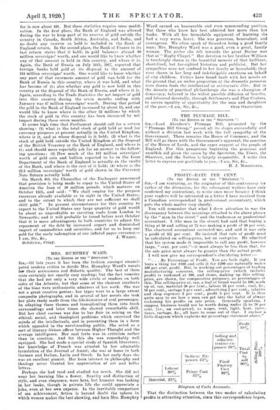MRS. HUMPHRY WARD.
[TO THE EDITOR OF THE " SPECTATOR."3
SilL,—Of late years it has been the fashion amongst emanci- pated modern critics to deride Mrs. Humphry Ward's novels for their seriousness and didactic quality. The best of them were certainly not exactly easy reading; but the fact remains that she had not only a very wide circle of readers on both sides of the Atlantic, but that some of the choicest intellects of the time were enthusiastic admirers of her work. She was not a great creative genius : her types were to a large extent composite photographs, and in several of her novels she took her plots ready made from the life-histories of real personages. In adapting these themes and transplanting them into fresh surroundings and later times she showed remarkable skill. But her chief success was due to her flair in seizing on the ethical, social, and theological problems which exercised the minds of the intellectuals, and in presenting them in a form which appealed to the novel-reading public. She acted as a sort of literary liaison officer between Higher Thought and the average intelligence. Her real forte was in criticism rather than in creation. And for this she was remarkably well equipped. She had made a special study of Spanish literature; her knowledge of French was attested by her admirable translation of the Journal of Arnie!; she was at home in both German and Italian, Latin and Greek. In her early days she was an excellent pianist. Her keen interest in philosophy and theology never blunted her appreciation of art and belles lettres.
Perhaps she had read and studied tco much. She did not wear her learning like a flower. Suavity and distinction of style, and even eloquence, were hers, but humour was lacking in her books, though in private life she could appreciate a joke, even at her own expense. In the inevitable comparison of sex achievement, fiction is beyond doubt the sphere in which woman makes the best showing, and here Mrs. Humphry
Ward earned an honourable and even commanding position. But those who knew her best admired her more than her books. With all her formidable equipment of learning she had a very warm heart. She was generous, benevolent, and courageous. We often speak of So-and-so being a good family man; Mrs. Humphry Ward was a good, even a great, family svornan. The pietas she felt towards the great Doctor was that of " Rugby Chapel." Her devotion to her brother William is touchingly shown in the beautiful memoir of that brilliant, short-lived, but far-sighted historian and publicist. But her sympathies were not confined to her family or household;. they were shown in her long and indefatigable exertions on behalf of city children. Critics have found fault with her novels on the ground that, an undue proportion of the dramatis personae were drawn from the intellectual or aristocratic Otte. But in • the domain of practical philanthropy she was a champion of democracy, believed in the widest possible diffusion of benefits, and laboured devotedly, through Settlements and Play Centres, to secure equality of opportunity for the sons and daughtere


































 Previous page
Previous page